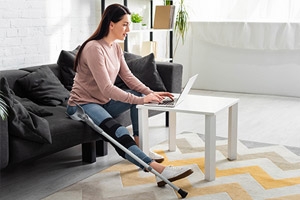The novel coronavirus has forever changed our healthcare system, and many are wondering what the patient experience will look like in a post-COVID-19 world. With several states, including Illinois, starting to resume elective surgeries, we now have a glimpse into what this may look like. This is not a swift return to normal – it is a carefully planned new normal.
Currently, Dr. Domb and the team of surgeons and healthcare professionals at the American Hip Institute & Orthopedic Specialists predict four major changes in the patient experience as we transition away from crisis mode: the widespread adoption of telemedicine, required use of personal protective equipment for staff and patients, a new appointment protocol, and a transition to outpatient facilities, rather than hospitals, to perform procedures.
Telemedicine
COVID-19 has forced many industries to do business digitally and work remotely. The healthcare industry is no different. Telemedicine has been an option for years, but almost overnight it became the norm for patients across the country for routine checkups and less urgent healthcare.
Virtual visits have many benefits, starting with the basic convenience of conducting an appointment from the comfort of your own home with zero travel time. Having no choice but to use telehealth to receive care and touch base with their doctors, many patients will experience its benefits. So much so that in the months and years ahead, patients will likely seek and expect that at least parts of their care be performed remotely.
PPE For All
One of the most dramatic impacts on the patient experience may come from something seemingly simple – the routine implementation of masks. Masks are proven to reduce transmission of viruses and will very likely become a more routine part of medical practice even after COVID-19. While patients are used to seeing nurses and doctors wearing masks and other personal protective equipment, it may become common for anyone in a health facility to don a mask, including patients themselves.
While this is undoubtedly beneficial for prevention of infection, it will be an obstacle in the development of trusted doctor-patient relationships. Physicians will have to make extra effort to connect with their patients without being able to see one another’s facial expressions.
Appointment Protocol
Universal use of PPE is not the only difference you will notice when you come in for an appointment. At American Hip Institute & Orthopedic Specialists specifically, the team has put in place new practices to maintain safety. For example, the waiting room will look different, with chairs spaced six feet apart to comply with CDC guidelines. Prior to entering the facility at all, patients are asked a series of screening questions to determine if it is safe to do so.
While these changes may take some getting used to, patients can rest easy knowing every possible precaution is being taken and considered to maintain their health and safety, both now and post-pandemic.
Outpatient Facilities
It has long been known that the risk of hospital-bourne infections is much lower in an ambulatory surgery center than in the hospital. For example, up to 2% of patients undergoing a hip replacement in a hospital setting will develop an infected hip after surgery. Data from the American Hip Institute Research Foundation suggests that performance of a hip replacement in the ambulatory surgery setting can reduce the rate of postoperative infection to 0.1%. Said another way, that means a 20-fold reduction in the risk of infection.
The height and concern for infection in society will cause both patients and doctors to prefer care in an outpatient center with a lower risk of hospital-borne infection. Knowing this, an accelerated migration of care from hospitals to outpatient facilities is likely on the horizon as elective procedures and non-COVID-19 healthcare resumes.
Do you have questions surrounding your healthcare, telemedicine appointment or more?
The team at AHI is here to ensure your patient experience remains exceptional and personalized.
Visit our website or contact us with your questions or concerns.




